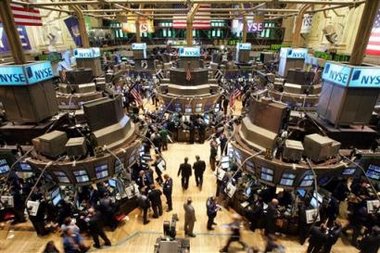 Traders look at computer monitors at the New York Stock Exchange in New York February 28, 2006. REUTERS/Seth Wenig
Traders look at computer monitors at the New York Stock Exchange in New York February 28, 2006. REUTERS/Seth WenigLooks like I'm not the only one who is puzzled by these numbers. This is from Yahoo News:
NEW YORK - A mixed economic picture sent stocks tumbling Tuesday, with the Dow Jones industrials falling more than 100 points after investors were unnerved by weakness in home sales, consumer confidence and manufacturing. An upward revision in the fourth-quarter gross domestic product, meanwhile, raised worries about higher interest rates.
The GDP showed that the economy grew at an annual rate of 1.6 percent, much better than the 1.1 percent the Commerce Department initially estimated and beating the 1.5 percent economists predicted. The GDP is the broadest measure of the economy's performance — and one indicator of whether the economy continues to grow fast enough to prompt additional interest rate hikes by the Federal Reserve.
The day's other data showed soft spots in the economy. Sales of existing homes fell for the fifth consecutive month January, exacerbating some investors' concerns that a fall in homes sales and refinancings could choke off a source of wealth for consumers, slowing their spending.
Consumer confidence numbers reinforced that worry, dropping below analysts' estimates in February, according to The Conference Board, a New York-based private research group. And a survey of Chicago-area purchasing managers fell unexpectedly; it's seen as a precursor of national manufacturing figures due to be released Wednesday.
"The GDP (gross domestic product) upgrade could put more pressure on the Fed," said Jack A. Ablin, chief investment officer at Harris Private Bank. "At the same time, we're losing ground with the consumer.... From the perspective of today's market, it's a one-two punch."
According to preliminary calculations, the Dow fell 104.14, or 0.94 percent, to 10,993.41.
Broader stock indicators also fell sharply. The Standard & Poor's 500 index fell 13.46, or 1.04 percent, to 1,280.66, and the Nasdaq composite index fell 25.79, or 1.12 percent, to 2,281.39, hurt by a sharp decline in Google Inc.
Bonds edged higher, with the yield on the 10-year Treasury note falling to 4.55 percent from 4.59 percent late Monday. The U.S. dollar fell against other major currencies. Gold prices rose.
Crude oil futures rose. A barrel of light crude was quoted at $61.41, up 41 cents, in trading on the New York Mercantile Exchange.
With scant earnings reports and few Federal Reserve speeches, economic data should continue to dominate the week, said Alexander Paris, economist and market analyst for Chicago-based Barrington Research.
"The problem is, investors have been going back and forth," about economic data, he said, pushing stocks higher on weak economic data one day, then lower on poor data another day.
"Sometimes they think a good economic report is good, other times they think it's bad," he said.Traders work on the floor of the New York Stock Exchange, Thursday, Feb. 23, 2006. Inflation concerns and a disappointing earnings report from Viacom Inc. prompted investors to collect profits Thursday, sending the major indexes modestly lower. (AP Photo/Mary Altaffer)
I don't usually post about the stock market's daily trading, but I thought that this story is an interesting complement to my previous post on the contradictory economic statistics. I would say that the investors and stock traders don't have a clue as to what is happening to this economy. When they see what appears to be good news, the investors are going to start buying stocks, causing the Dow to rise. When there's bad news, investors will sell, causing the Dow to fall. Normally, we'd see these small, incremental changes in the stock market during a regular, sustained economic growth. But if we're going to start seeing contradictory economic statistics, traders are going to have problems figuring out where the economy is heading--and where the market is heading. I'd say we're going to be in for some wild swings in the stock market for this year.



No comments:
Post a Comment